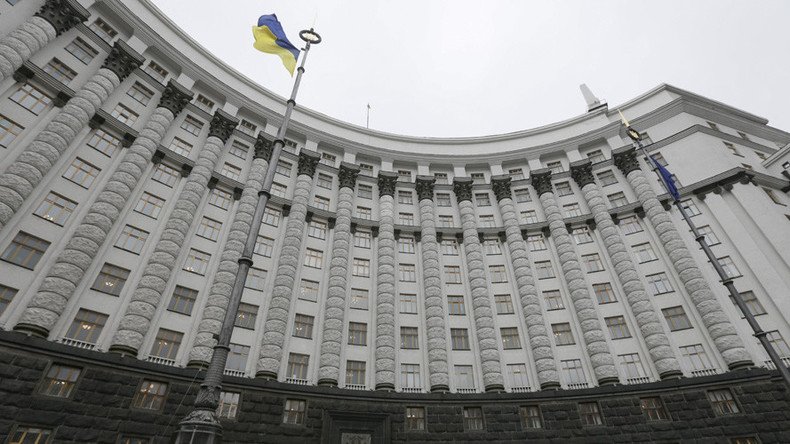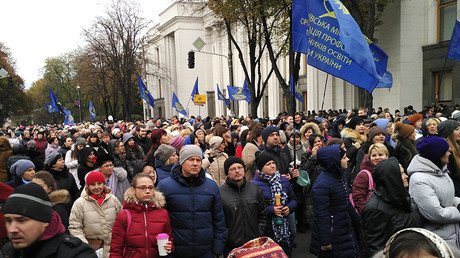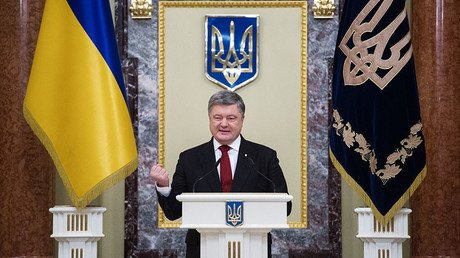‘Slap in the face:’ HRW slams Ukraine’s new law targeting anti-corruption activists

Human Rights Watch (HRW) has sharply criticized a newly-adopted amendment to Ukraine’s anti-corruption law by saying that it instead targets journalists and anti-corruption activists and could prevent them from doing their job.
The new amendment adopted by the Ukrainian parliament on March 23 and signed by the President Petro Poroshenko on March 27 requires activists and journalists reporting on government corruption to file public declarations of their personal assets, even though they do not receive public funding.
If they fail to do so, they could face up to two years in jail, the same penalties government officials face. The amendments also envisage exempting military personnel engaged in active duty in the armed conflict in eastern Ukraine from publicly declaring their personal assets at the same time.
HRW Ukraine researcher Tanya Cooper denounced the new amendment as a “a slap in the face of Ukraine’s anti-corruption activists and its international partners, who have been calling for a more transparent government.” The international NGO urged Poroshenko to “to annul the new measure,” which it describes as “an unjustified interference with freedom of expression and other rights protected by Ukraine’s human rights obligations.”
“The requirement conflates state officials, who have a responsibility to divulge their assets because they enjoy certain privileges of office and their work is funded by tax payers, with private citizens who report on issues of public interest,” Cooper added.
The amendments “targeting anti-corruption activists and journalists” violate “several human rights – such as freedom of expression and the right to privacy – protected by international treaties to which Ukraine is a party, as well as in its own constitution,” HRW said, adding that “independent groups and journalists are essential to Ukraine’s anti-corruption reform and should not be intimidated or punished for their work.”
‘No one fooled by true purpose of new law’
HRW believes that instead of helping to fight corruption, the new amendment is in fact aimed against anti-corruption activists and is designed to impede their work. The NGO said that interference into the personal finances of journalists and activists, which is based solely on the nature of their work, “is not justified as either necessary or proportionate.”
The new measure has a “chilling effect on members of civil society and on media reporting on abuse of state power and public office [and is] not a justified interference with freedom of expression standards under international law.”
The measure was also criticized by some western officials.
E-declarations should target #corruption in public administration - not hamper work of civil society. 3/4
— Johannes Hahn (@JHahnEU) March 24, 2017
The Commissioner for European Neighbourhood Policy and Enlargement Negotiations, Johannes Hahn, said on Twitter: “E-declarations should target corruption in public administration – not hamper work of civil society.”
Changes to #edeclarations law a serious step back. Could limit NGOs capacity, expose them to pressure & affect reform. Needs urgent review
— Judith Gough (@JudithGoughFCO) March 24, 2017
The UK ambassador to Ukraine called it a “serious step back [that] could limit NGOs capacity, expose them to pressure & affect reform.”
The US embassy in Kiev said that “members of civil society play vital role for transparency; targeting them is a step backwards.”
2. Members of civil society play vital role for transparency; targeting them is a step backwards.
— U.S. Embassy Kyiv (@USEmbassyKyiv) March 23, 2017
“No one is fooled by the true purpose of this amendment,” HRW’s Cooper said. “President Poroshenko should urge parliament to immediately annul it. Such measures have no place in a reform-minded government.”
After the 2014 coup, the new Ukrainian leadership vowed to conduct ambitious anti-corruption reforms and to create a more transparent government. It was also one of the requirements for EU visa-free travel for the Ukrainians.
However, the European Court of Auditors (ECA) that reviewed the progress the Ukrainian authorities have made in fighting corruption said it its December 2016 report that corruption is still the biggest threat to foreign support of Ukraine by the sponsors.
“Despite reform efforts, Ukraine is still perceived as the most corrupt country in Europe. Vested interests influence public policy-making. Oligarchic clans continue to exert a dominant influence on Ukraine’s economy, politics and media,” the report said at that time.
The perception of Ukraine as a highly-corrupt nation has been repeatedly fueled by a number of high-profile scandals, including Poroshenko’s appearance in the so-called Panama Papers, the abundance of cash and luxuries in declarations of property published by the Ukrainian officials under EU pressure, and the latest claims by a former Poroshenko ally, who alleged he was involved in rigging parliamentary votes on the president’s behalf.














